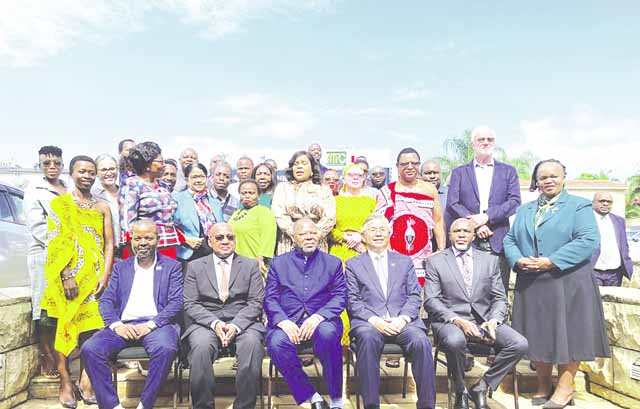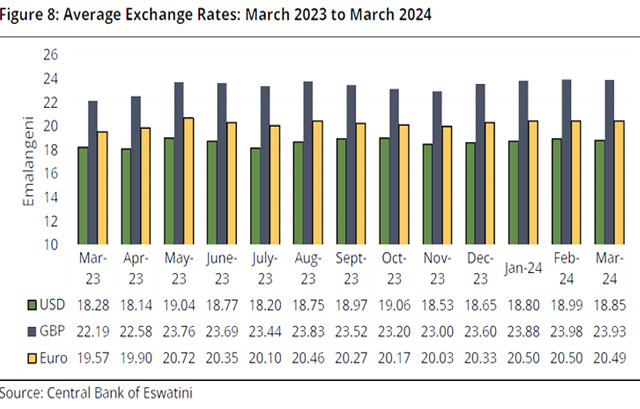By Nomfanelo Maziya | 2024-03-10

Eswatini has launched its long-awaited African Continental Free Trade Area (AfCFTA) Implementation Strategy, aiming to unlock significant economic benefits for the kingdom.
The strategy, unveiled by Dr. Mzwandile Mfunwa, acting Chief Subregional Officer for Southern Africa at the UN Economic Commission for Africa (ECA), during the launch at Happy Valley yesterday. outlined a seven-point approach to maximise the country's benefits under the AfCFTA, targeting an annual regional export growth of at least 10 per cent.
“The strategy emphasises increasing and diversifying local production for AfCFTA markets in priority sectors,” Dr. Mfunwa stated.
This includes focusing on agro-processing particularly beef, food processing, and sugar value chains, as well as light manufacturing, specifically leather, clothing and textiles.
“The plan also prioritises developing MSME export readiness programmes targeting AfCFTA markets," Dr. Mfunwa noted.
This aims to equip small and medium-sized enterprises with the necessary tools and knowledge to compete effectively in the wider African market, he said.
Improving access to development finance to encourage exports is another crucial element, as highlighted by Dr. Mfunwa.
He said this would involve facilitating access to financial resources for businesses seeking to expand their export operations.
“The strategy calls for improved border management coordination at domestic and bilateral levels,” Dr. Mfunwa emphasised, highlighting that this aims to streamline trade processes and reduce administrative burdens at borders, ensuring the smooth flow of goods.
The plan underscores the importance of increasing sector specific support for AfCFTA and other identified sectors in trade in goods.
This includes focusing on both existing strengths and potential areas for diversification, such as automotives and pharmaceuticals.
Prioritising business climate improvements is another key pillar, according to Dr. Mfunwa.
He said this involved creating a more conducive environment for businesses to operate and grow, attracting investment and fostering economic activity.
The strategy further recognises the need to develop a competitive services sector to attract investment and diversify exports, focusing on areas like tourism and the creative industries, which hold significant potential for growth.
Focus
While leveraging its current strengths in agro-processing and light manufacturing is a key initial focus, the strategy acknowledges the need for building blocks that will allow for increased volumes and diversity of exports.
By implementing this comprehensive strategy, Eswatini aims to tap into the vast potential of the AfCFTA, fostering economic growth, creating jobs and enhancing its position within the continental market.
He further highlighted five crucial aspects for its successful implementation.
"The action plan drawn from the seven objectives, with clear activities, responsible institutions, indicators, and expected timelines, will serve as the guiding map for Eswatini's AfCFTA journey," Dr. Mfunwa explained.
He emphasised the importance of financing mechanisms available to support the implementation of the AfCFTA.
"An active communication and visibility plan is crucial to ensure adequate public awareness and involvement in AfCFTA issues," Dr. Mfunwa stressed.
He further highlighted the need for a robust monitoring and evaluation framework, spearheaded by the proposed AfCFTA National Implementation Committee under the existing National Trade Facilitation Committee (NTFC) as this framework will track progress, identify challenges, and inform adjustments to ensure the strategy remains on track and delivers desired outcomes.
He emphasised the importance of a capacitated and adequately resourced NTFC for effective coordination across key stakeholders, including gender and youth mainstreaming which remain weak.
He concluded by reiterating ECA's commitment to supporting Eswatini in implementing the AfCFTA strategy.
He reaffirmed that ECA would continue to play its supporting role, complementing the efforts of the UN Country Team in Eswatini, to ensure the successful realisation of the country's AfCFTA vision within the framework of the United Nations Sustainable Development Cooperation Framework.
Emphasised
UN Resident Coordinator George Wachira emphasised the significance of this step towards realising a borderless Africa where trade and investment flourish seamlessly across the continent. Wachira highlighted the shift from aid dependence to trade-led development, driven by a robust private sector and a supportive policy environment.
Wachira emphasised the vast potential of intra-African trade, currently at 18 per cent compared to Europe's 70 per cent within its internal market.
“With a population of 1.2 billion, Africa presents a game-changing opportunity. Studies suggest that Africa's manufacturing sector alone could generate an additional US$1 trillion and create 14 million jobs by next year if the AfCFTA is successful,” said Wachira.
He described the Eswatini strategy as more than just a plan.
“It's a ‘blueprint for prosperity’ that leverages the country's unique strengths and positions it to unlock the vast opportunities presented by the AfCFTA.
This includes expanding intra-African exports as Eswatini currently exports less than 2 per cent of its goods to other African nations. The strategy aims to significantly increase this figure,” he said.
Wachira said the strategy sought to strengthen Eswatini's position in the global market by diversifying its markets and boosting its production capacity, further developing cross-border infrastructure by facilitating trade with neighbouring countries through improved infrastructure is a key focus.
Acknowledging the potential challenges, Wachira highlighted the valuable insights gained during the strategy development process and national discussions.
These insights inform the key reforms required to ensure Eswatini can maximise benefits from the AfCFTA, particularly in attracting investments and fostering manufacturing and industrialisation.
Recognising the interconnectedness of various aspects, Wachira stressed the need for a holistic approach from investment and trade policies to education, skills development and digitalisation, all elements need to be aligned to support the strategy's goals.
He said collaboration and coordination across government departments would be crucial to avoid duplication, optimise resources and create synergies.
“This approach fosters inclusive communication, information sharing, and collaborative decision-making essential for seamless service delivery to citizens and businesses,” he said.
share story
Post Your Comments Below
Neighbourhood Watch schemes can go a long way in bringing crime under control in communities.

The Lilangeni's recent appreciation against major foreign currencies has reduced the value of Esw...

SOCCER - DENVER Sundowns head coach Musa Manyatsi was left fuming over the match officiating afte...

OVER 10 000 fashion and music fanatics attended the third edition of the Makoti Festival on Satur...
All material © Swazi Observer. Material may not be published or reproduced in any form without prior written permission.
Design by Real Image Internet